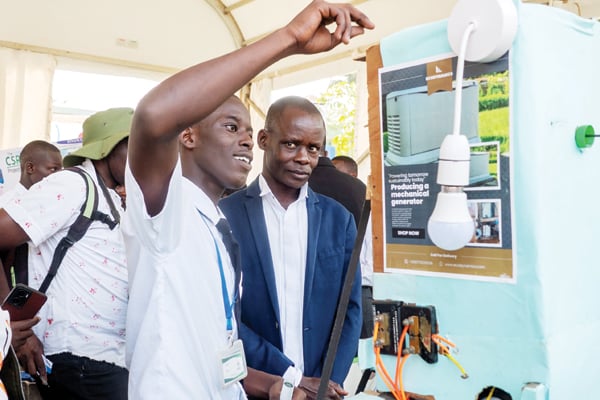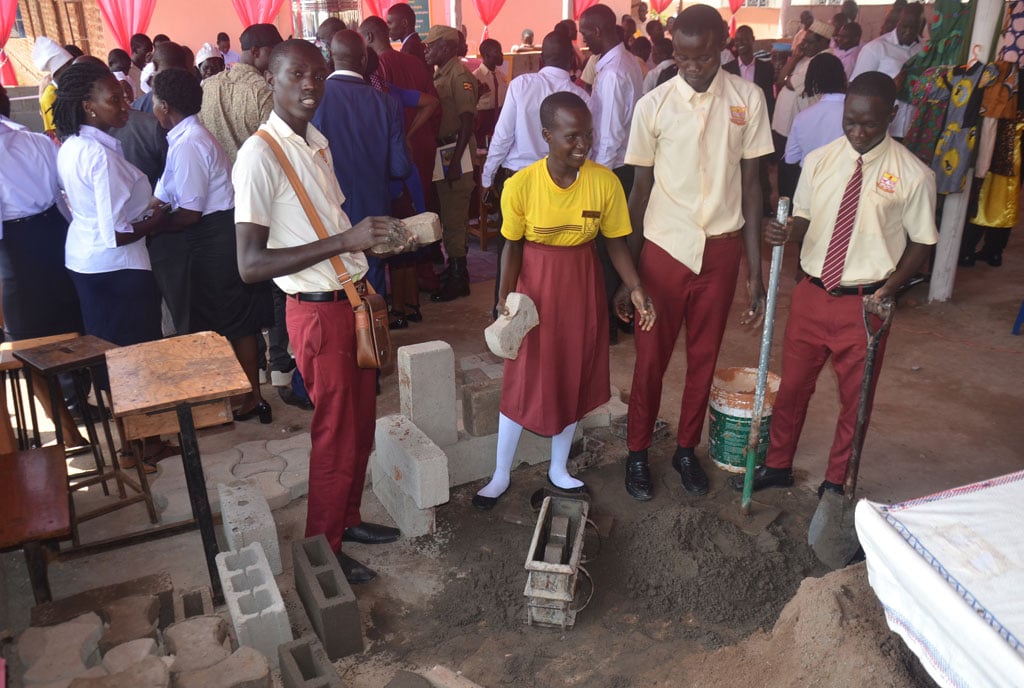JAU, popularising entrepreneurship education among young people

A student talks about his innovation during the Company of the Year competitions organised by Junior Achievement Uganda. PHOTOS | ESTHER BRIDGET NAKALYA
What you need to know:
- Fast forward, Adeke has used the interest from savings to put up several businesses that sustain her family hence eradicating poverty.
Joline Adeke was only 11 years old when she started saving.
“My mother had a women’s savings group at home where she would save all her earnings from the maize harvests. Every time she went to meet with the SACCO she took me along with her and I realized that on each sitting, a member walked away with a good amount of savings that was distributed in rounds amongst themselves.”
After a good thought, she also decided that she wanted to join the savings group to support her peasant mother in raising her school fees and improve the livelihood of their household.
She says, “I needed to support my mother in providing school requirements for my four younger siblings and yet I had no income to support my membership in the women’s SACCO back at home.”
It was at such a prompt time that Junior Achievement Uganda (JAU) introduced the entrepreneurship programme at Adeke’s school where a school club was formed under the guidance of a patron to support young innovators.
“I was asked by my Patron to come up with an innovation that would be ideal in conserving the environment. My first stop was the remaining product from my mother’s charcoal business,” she says.
Adeke then collected the charcoal dust in sacks and started making briquettes which she would sell off at Shs five hundred and in a period of three months, she had accumulated about Shs230,000 which she used to support her siblings and put the rest into savings.
Fast forward, Adeke has used the interest from savings to put up several businesses that sustain her family hence eradicating poverty.
Just like Adeke, the JAU programme has empowered about 3,5000 young people from both Kampala and Masaka regions with entrepreneurship education.
The programmeme
In its fourth year, the initiative inclusively engages learners across the central region in different skilling programmes such as the Chaching programme for Primary school learners, the social equity programmes for institutions and illiterates as well as the digital programme; online and career matching programme that allows learners to get internships and job opportunities.
According to Aseli Mujeni, the vice president of marketing and partnerships at Junior Achievement Africa, the programme seeks to address issues of unemployment among the youth by equipping them with entrepreneurship and financial management skills.
She says, “We empower youth in about 16 countries across sub Saharan Africa and are currently reaching out to over 1 million youth every year,” adding that there is a gap in the number of youth taking up hard skills.
She cautions, “Africa graduates over 11 youth annually and out of those only 3million end up getting white collar jobs so what happens to rest?”
Mutekanga George, the assistant commissioner for private schools, institutions and higher learning at the Ministry, told the daily monitor in an interview that the programme aims at benefiting the youngest population in the country through entrepreneurship education.
He says, “Much as young people have attended school through UPE and other programmes, our biggest concern remains as unemployment,” adding that the Ministry has come up with new curriculum to address the high levels of unemployment by skilling the youth on, “, agribusiness, commerce, physical education, food and nutrition, technical drawing, art and design among the eight vocational subjects.”
The initiative recently introduced the first of its kind ‘company of the year competitions’ which encourages student innovators from nine different schools of Kololo S.S, Mengo S.S, Sacred Heart S.S-Kyotera, Manifest International Schools and Seeta High School among others to showcase practical skills that promote environmental stewardship and resource conservation under the theme green innovations.
Mutekanga also applauds the initiative for empowering, encouraging and promoting skills among all generations.
He says, “I thank the students and winners that have participated in this annual event that begins at school level, regionals, district, national level and later Africa.”
The winners are expected to represent Uganda at the JA Africa Regional Company of the year competition in Mauritius on December 4th- 6th, 2024.
Purpose
Ms Milly Mugenyi, a teacher and patron at Seeta High School says, “The company of year competitions empower learners with skills of work readiness, innovation and financial literacy.”
She encouraged parents and teachers to avail the young people with these skills and shift away from fears of having children to deal with money.
Mugenyi further commends the programme for nurturing innovative ideas among students adding that, “It emphasises training on financial discipline and making money so that young people can protect and use money reasonably rather than wasting.”
According to Ms Rachael Mwagale, the Executive Director at JAU, young people are supported to make informed decisions, plan for their futures, and to build a foundation of financial stability and success.
She explains, “Through the training programmes, our participants have learnt the importance of budgeting, saving, investing and understanding the dynamics of credit and debt. They have also developed a keen sense of entrepreneurship and the confidence to navigate the financial challenges of the modern world,”
The Company of the Year competitions set out to encourage business companies in schools which aligns with an objective of imparting entrepreneurship skills among young people.
Mutekanga further notes, “Today, our young generation should know the importance of financial literacy where we find that they can start companies at school with a team of marketing and sales, Public relations hence borrow a leaf from the employment world.”
These structures he adds “helps them to appreciate the job world and the specific roles but also how to address environmental concerns such as climate change and green evolution in the business world.”
Challenges
There is a growing need to scale up the programme to reach a big group of both learners and opinion leaders. Mutekanga says, “Our biggest concern is that few people can access the training and information from this project. Therefore, we want to engage all structures such as the District officers, inspectors of schools, municipal inspectors, teachers’ associations to ensure the entire population gets to know about the event.”
He also points out the gap among participating groups stating that, “We have almost 10 to 15million children in school and we have only few participating in the programme and yet these are the leaders coming out.”
In order to embrace innovations, initiatives, creativity, critical thinking among the young generation, he urges schools to support more business companies and encourage bank accounts for the young generation in order to manage financial knowledge and build on local companies in the future.
Support
According to the Ministry of Education, the government is committed to supporting skilling programmes which is evident in the new curriculum.
“It is commendable work that has been demonstrated by Junior Achievement Uganda and Africa in empowering young people with entrepreneurship skills and knowledge. This is beefing up our new approach to our education system in the new curriculum.” a speech by the state minister for higher education Mr John Chrisostom Muyingo reads in part.
Ms Mwagale recommends the new curriculum in allowing a more interactive learning environment which starts at home.
She urges, “It should start with parents at home by mentoring them in innovative programmes because if parents focus on high grades at the best then the school will implement that at the expense of skilling the learners.”
According to Ms Mugenyi, the schools are supporting learners and teachers to run and implement projects.





